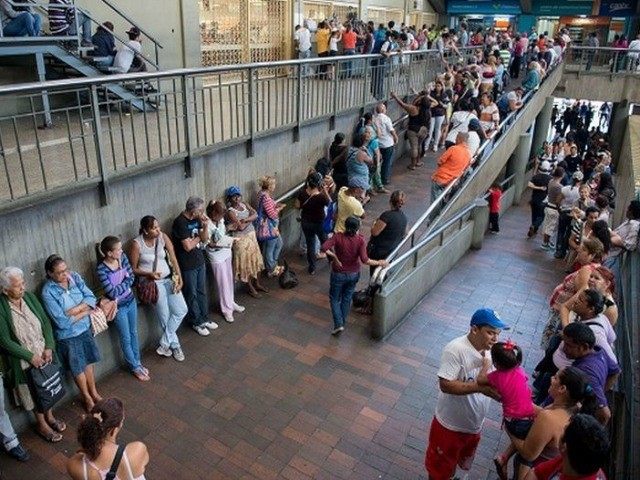Venezuela’s economy has slumped to such lows that unemployed individuals are taking up jobs as professional standers-in-line: taking the place of people who pay them to stand for hours, blocks away from grocery stores, for access to limited supplies of milk, flour, and other necessary goods.
As Reuters reports, shortages of basic goods in Venezuela have reached such depths that a typical line to buy products at a supermarket often “snaked around the block” and lasted hours, making it impossible for many individuals with children, pregnant women, or those with diseases to withstand hours in the sun and hot weather. One woman speaking to Reuters, pregnant with a fourth child, described an average trip to the grocery story as “savage, people running everywhere.”
That demand for labor that involves patience and enduring the elements has opened up an entirely new market for those willing to do the work. Reuters describes the job as “starting before dawn, enduring long hours under the sun, dodging or bribing police, and then selling a coveted spot at the front of huge shopping lines.”
Speaking to the Mexican publication Excelsior, one of these line professionals, identified only as “Luis,” described standing in line as “not a bad way to make a living.” The newspaper describes him as a “line professional,” and, as a 23-year-old healthy man, he has the build and resilience to make it through lines that his clients simply cannot survive.
Not that standing in line is exclusively a man’s business. A woman identified as Krisbell Villarroel, a 22-year-old from Caracas, explained her routine as a line professional to the Agence France-Presse: “Every day I have to wake up at 2 A.M. and call my friends to know where they are or what products they are going to sell.” She begins standing in line at 10 A.M. “Sometimes we will find milk, sugar, or coffee in one place, but flour, rice, diapers, or shampoo in another.”
Excelsior reports that it costs about 600 Bolivars, or $94.49, to hire a line professional.
The effort citizens must make to buy household items like sugar and milk is especially shocking given Venezuela’s position as a member of OPEC and one of the world’s richest countries in oil production. Price controls designed to limit market spending in the nation’s socialist economy have triggered shortages of a list of unimaginable items, in addition to basic needs, with coffins, breast implants, and toilet paper among the most bizarre. The only product that has become significantly easier and cheaper to buy during the tenure of President Nicolás Maduro is Scotch whiskey.
Visiting Venezuela on what some have labeled a human rights awareness mission, former Colombian President Andrés Pastrana and former Chilean President Sebastián Piñera, both right-wing politicians, cited the extremely long lines at groceries as one of the most concerning issues facing Venezuela today. “The lines truly caught our attention,” said Pastrana. “It was very impressive, when we stopped and asked if there was a concert or soccer game but no, those were lines to buy food.” The presidents called the lines “humiliating.”
The Venezuelan government is claiming that the grocery lines are getting shorter, blaming the worsening of lines in the post-Christmas season on “the economic war”–presumably waged by the United States–and insisting that “calm has returned” to Venezuela.

COMMENTS
Please let us know if you're having issues with commenting.